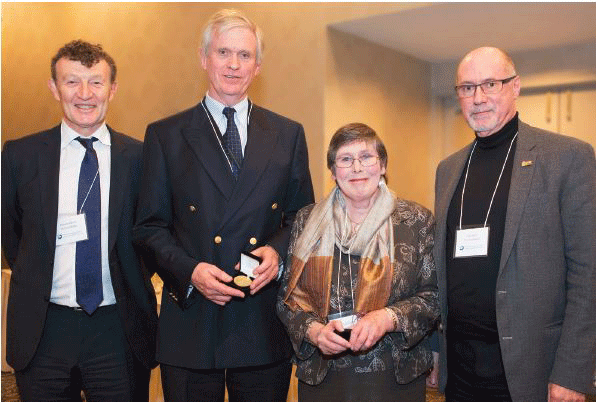Congratulations to the 2015 Doctors of BC Terry Fox Medal winners

Terry Fox Award presentations on 16 November 2015. Left to right: Dr Malcolm Moore, president, BC Cancer Agency; Drs John Hay and Judith Pike, medal winners; and Dr Bill Cavers, Doctors of BC past president.
Two recently retired BC Cancer Agency Vancouver Centre physicians are winners of this year’s Doctors of BC Terry Fox Medals: Dr John Hay, recently retired radiation oncologist at the BC Cancer Agency’s Vancouver Centre, and Dr Judith Pike, long-serving general practitioner in oncology.
The Terry Fox Medal recognizes individuals conducting clinical practice, research, or teaching/education who have achieved national or international recognition based on the following:
• A distinguished career of achievement in their area of focus.
• A seminal advance through the conduct of their endeavors.
• Promotion and achievement of advance in the conduct of cancer medicine and cancer control.
As a highly respected oncologist, an outstanding clinician and teacher, and an admired leader in radiation oncology in Canada, Dr Hay has provided exceptional care to thousands of cancer patients in BC. Among his many roles Dr Hay served as president of the BC Cancer Agency’s Professional Advisory Committee from 1991 to 1993, examiner in radiation oncology for the Royal College of Physicians and Surgeons of Canada from 1991 to 1996, and member of the head and neck site group executive of the National Cancer Institute of Canada, Clinical Trials Group, from 1993 to 2001. Dr Hay has co-authored 38 publications and two book chapters in radiation oncology in head and neck, esophageal, and colorectal cancers. He also made a major contribution to patient care when he was integral in changing the BC Cancer Agency protocol for rectal cancer from postoperative radiation to neo-adjuvant therapy, with resultant changes to surgical technique. This led to a significant decrease in BC’s provincial recurrence rates for rectal cancer.
Dr Pike played a pivotal role in developing and launching the BC Cancer Agency’s Family Practice Oncology Network and its GPO Training Program, which ultimately changed how cancer care is delivered in rural BC and Yukon communities. Her dedication and creativity ensured cancer patients can receive top level care closer to home, in proximity of their loved ones and without the need for travel to larger centres. Dr Pike is responsible for the original success of the GPO Training Program, which enables its graduates to provide this care (including the administration of chemotherapy) and serve as oncology resources and educators for other primary care providers in their communities. Dr Pike organized all aspects of this training on a volunteer basis outside of her regular GPO responsibilities. She also contributes significantly to planning the network’s continuing medical education programs and developing cancer care guidelines for family physicians.
The Terry Fox Medals were presented on 16 November 2015 by Dr Bill Cavers at the Terry Fox Research Institute Research Day in Vancouver.
